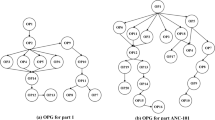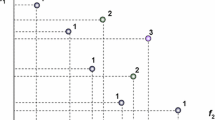Abstract
In this research, a hybrid constrained permutation algorithm and genetic algorithm approach is proposed to solve the process planning problem and to facilitate the optimisation process. In this approach, the process planning problem is represented as a graph in which operations are clustered corresponding to their machine, tool, and tool access direction similarities. A constrained permutation algorithm (CPA) developed to generate a set of optimised feasible operations sequences based on the principles of minimising the number of setup changes and the number of tool changes. Due to its strong capability in global search through multiple optima, genetic algorithm (GA) is used to search for an optimal or near optimal process plan, in which the population is initialised according to the operations sequences generated by CPA. Furthermore, to prevent premature convergence to local optima, a mixed crossover operator is designed and equipped into GA. Four comparative case studies are carried out to evidence the feasibility and robustness of the proposed CPAGA approach against GA, simulated annealing, tabu search, ant colony optimisation, and particle swarm optimisation based approaches reported in the literature, and the results are promising.









Similar content being viewed by others
References
Al-wswasi, M., Ivanov, A., & Makatsoris, H. (2018). A survey on smart automated computer-aided process planning (ACAPP) techniques. International Journal of Advanced Manufacturing Technology, 97(1–4), 809–832.
Ding, L., Yue, Y., Ahmet, K., Jackson, M., & Parkin, R. (2005). Global optimization of a feature-based process sequence using GA and ANN techniques. International Journal of Production Research, 43(15), 3247–3272.
Dou, J., Li, J., & Su, C. (2018a). A discrete particle swarm optimisation for operation sequencing in CAPP. International Journal of Production Research, 56(11), 3795–3814.
Dou, J., Zhao, X., & Su, C. (2018b). An improved genetic algorithm for optimization of operation sequencing. In Proceedings of 2018 IEEE International Conference on Mechatronics and Automation, ICMA 2018 (pp. 695–700).
Guo, Y. W., Mileham, A. R., Owen, G. W., & Li, W. D. (2006). Operation sequencing optimization using a particle swarm optimization approach. Proceedings of the Institution of Mechanical Engineers, Part B: Journal of Engineering Manufacture, 220(12), 1945–1958.
Hu, Q., Qiao, L., & Peng, G. (2017). An ant colony approach to operation sequencing optimization in process planning. Proceedings of the Institution of Mechanical Engineers, Part B: Journal of Engineering Manufacture, 231(3), 470–489.
Huang, W., Hu, Y., & Cai, L. (2012). An effective hybrid graph and genetic algorithm approach to process planning optimization for prismatic parts. International Journal of Advanced Manufacturing Technology, 62(9–12), 1219–1232.
Huang, W., Lin, W., & Xu, S. (2017). Application of graph theory and hybrid GA-SA for operation sequencing in a dynamic workshop environment. Computer-Aided Design and Applications, 14(2), 148–159.
Krishna, A. G., & Mallikarjuna Rao, K. (2006). Optimisation of operations sequence in CAPP using an ant colony algorithm. International Journal of Advanced Manufacturing Technology, 29(1–2), 159–164.
Li, W. D., O, S. K., & N, A. Y. C. (2002). Hybrid genetic algorithm and simulated annealing approach for the optimization of process plans for prismatic parts. International Journal of Production Research, 40 1899.
Li, W. D., Ong, S. K., & Nee, A. Y. (2004). Optimization of process plans using a constraint-based tabu search approach. International Journal of Production Research, 42(10), 1955–1985.
Li, X., Gao, L., & Wen, X. (2013). Application of an efficient modified particle swarm optimization algorithm for process planning. International Journal of Advanced Manufacturing Technology, 67(5–8), 1355–1369.
Lian, K., Zhang, C., Shao, X., & Gao, L. (2012). Optimization of process planning with various flexibilities using an imperialist competitive algorithm. International Journal of Advanced Manufacturing Technology, 59(5–8), 815–828.
Liu, X. J., Yi, H., & Ni, Z. H. (2013). Application of ant colony optimization algorithm in process planning optimization. Journal of Intelligent Manufacturing, 24(1), 1–13.
Ma, G. H., Zhang, Y. F., & Nee, A. Y. (2000). A simulated annealing-based optimization algorithm for process planning. International Journal of Production Research, 38(12), 2671–2687.
Moon, C., Kim, J., Choi, G., & Seo, Y. (2002). An efficient genetic algorithm for the traveling salesman problem with precedence constraints. European Journal of Operational Research, 140(3), 606–617.
Musharavati, F., & Hamouda, A. S. M. (2011). Modified genetic algorithms for manufacturing process planning in multiple parts manufacturing lines. Expert Systems with Applications, 38(9), 10770–10779.
Nallakumarasamy, G., Srinivasan, P. S., Venkatesh Raja, K., & Malayalamurthi, R. (2011). Optimization of operation sequencing in CAPP using simulated annealing technique (SAT). International Journal of Advanced Manufacturing Technology, 54(5–8), 721–728.
Petrović, M., Mitić, M., Vuković, N., & Miljković, Z. (2016). Chaotic particle swarm optimization algorithm for flexible process planning. International Journal of Advanced Manufacturing Technology, 85(9–12), 2535–2555.
Reddy, S. V., Shunmugam, M. S., & Narendran, T. T. (1999). Operation sequencing in CAPP using genetic algorithms. International Journal of Production Research, 37(5), 1063–1074.
Salehi, M., & Bahreininejad, A. (2011). Optimization process planning using hybrid genetic algorithm and intelligent search for job shop machining. Journal of Intelligent Manufacturing, 22(4), 643–652.
Salehi, M., & Tavakkoli-Moghaddam, R. (2009). Application of genetic algorithm to computer-aided process planning in preliminary and detailed planning. Engineering Applications of Artificial Intelligence, 22(8), 1179–1187.
Su, Y., Chu, X., Chen, D., & Sun, X. (2018). A genetic algorithm for operation sequencing in CAPP using edge selection based encoding strategy. Journal of Intelligent Manufacturing, 29(2), 313–332.
Su, Y., Chu, X., Zhang, Z., & Chen, D. (2015). Process planning optimization on turning machine tool using a hybrid genetic algorithm with local search approach. Advances in Mechanical Engineering, 7(4), 1–14.
Wang, J. F., Wu, X., & Fan, X. (2015). A two-stage ant colony optimization approach based on a directed graph for process planning. International Journal of Advanced Manufacturing Technology, 80(5–8), 839–850.
Wang, Y. F., Zhang, Y. F., & Fuh, J. Y. (2012). A hybrid particle swarm based method for process planning optimisation. International Journal of Production Research, 50(1), 277–292.
Wen, X. Y., Li, X. Y., Gao, L., & Sang, H. Y. (2014). Honey bees mating optimization algorithm for process planning problem. Journal of Intelligent Manufacturing, 25(3), 459–472.
Xu, L., Deng, W., Liu, W., Ma, S., Li, A., & Matta, A. (2014). Optimization of process planning for cylinder block based on feature machining elements. In Conference Proceedings–IEEE International Conference on Systems, Man and Cybernetics (vol. 2014, pp. 2575–2580).
Yun, Y., & Moon, C. (2011). Genetic algorithm approach for precedence-constrained sequencing problems. Journal of Intelligent Manufacturing, 22, 379–388.
Zacharia, P. T., Tsirkas, S. A., Kabouridis, G., & Giannopoulos, G. I. (2015). Planning the construction process of a robotic arm using a genetic algorithm. The International Journal of Advanced Manufacturing Technology, 79(5–8), 1293–1302.
Zacharia, P. T., Tsirkas, S. A., Kabouridis, G., Yiannopoulos, A. C., & Giannopoulos, G. I. (2018). Genetic-Based Optimization of the Manufacturing Process of a Robotic Arm under Fuzziness. Mathematical Problems in Engineering, 2018, 1–12.
Zhang, F., Zhang, Y., & Nee, A. (1997). Using genetic algorithms in process planning for job shop machining. IEEE Transactions on Evolutionary Computation, 1(4), 278–289.
Author information
Authors and Affiliations
Corresponding author
Additional information
Publisher's Note
Springer Nature remains neutral with regard to jurisdictional claims in published maps and institutional affiliations.
Rights and permissions
About this article
Cite this article
Falih, A., Shammari, A.Z.M. Hybrid constrained permutation algorithm and genetic algorithm for process planning problem. J Intell Manuf 31, 1079–1099 (2020). https://doi.org/10.1007/s10845-019-01496-7
Received:
Accepted:
Published:
Issue Date:
DOI: https://doi.org/10.1007/s10845-019-01496-7




